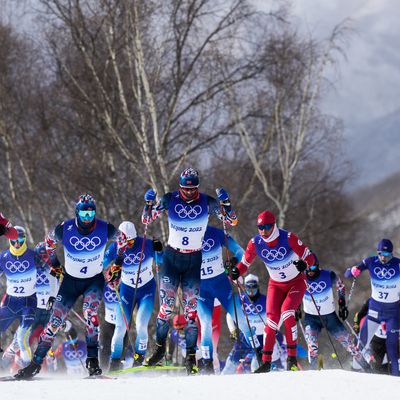
How much would you risk for a gold medal in cross-country skiing? How much would you risk to place 26th in an Olympic race? Hours of sleep? Cake? A social life? What about your genitals? Olympic cross-country skier almost faced this very dilemma on Saturday, February 19, the final day of the 2022 Winter Olympics. After competing in the men’s 50-kilometer mass-start race, Finland’s Remi Lindholm implied that his dick was “a little bit frozen” from the competition. And I have to ask, is this worth it?
Lindholm joked about his, uh, chilly appendage, reportedly telling Finnish media, “You can guess which body part was a little bit frozen when I finished.” He also assured reporters that he was able to warm up with the help of a strategically placed heat pack, but he admitted that things felt a little worse before they got better. “When the body parts start to warm up after the finish, the pain was unbearable,” he said, per E! News. According to reports, Lindholm took about an hour and a half to complete the race, which was actually shortened from 50 kilometers to 30 kilometers due to severe weather conditions. “It was one of the worst competitions I’ve been in,” he said. “It was just about battling through.”
Apparently, this is not the first time Lindholm has talked about the frozen-penis side effect of being a competitive cross-country skier. Meanwhile, other skiers have described the great lengths necessary to keep warm while competing in the sport. USA Today reported earlier in the week that athletes in Beijing were putting KT Tape, a kind of stretchy sports tape that can be used to tape up injuries or support tendons, muscles, etc., on their faces in what I can only assume was an effort to keep their faces from freezing off. The tape is believed to help fight windchill, but, as KT Tape CEO Greg Venner told the newspaper, there is no evidence to show that the tape is actually effective, and using it on the face and other delicate skin areas can be dangerous. “Although it isn’t a clinically approved usage, we appreciate the ingenuity,” he said.
No offense to Lindholm and other Olympic athletes who compete in these impossibly cold sports, but I have to state the obvious. If a sport is putting athletes in dangerous, potentially fatal situations just based on the environment alone (outdoor, weather, etc.), then maybe we should stop including it in the Olympics.


